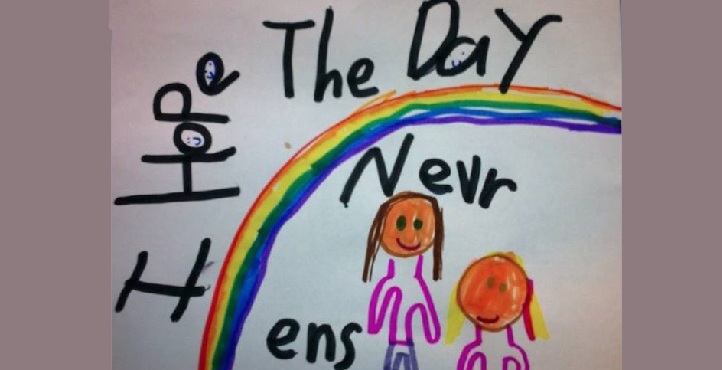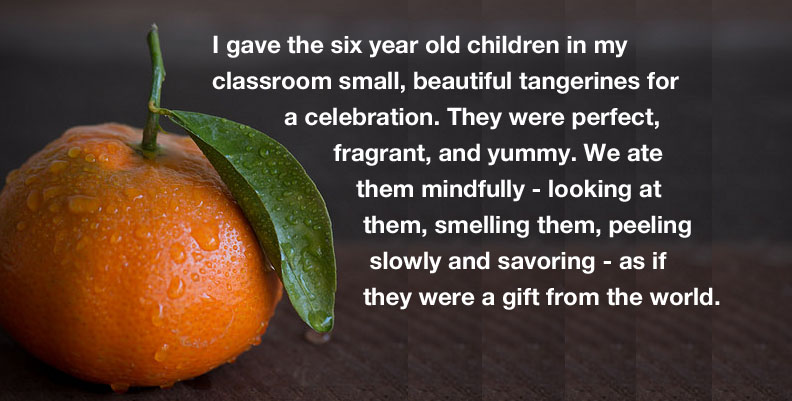By Michelle Strater Gunderson.
What does it mean to teach our youngest students?
It means that we have the privilege of guiding dear persons in having good and fulfilled lives.
It means learning to wait for someone else to tie their shoes before running out to recess. It means working for days on end to learn the difference between a lower case b and d. It means learning to be careful with your words and actions.
I am always so taken by how many mistakes my first graders make in the course of a day, and how willing they are to pick themselves back up and try again. The following story happened last week and reminded me of how precious and vulnerable children are at this age.
During our sharing time one of my students wanted to sing a song she had made up for our class. She sat in the sharing chair and started singing a heart-felt song about how different she was than everyone else and what it felt to be like her. Two of the boys sitting in front of her plugged their ears.
I was appalled. How could children who have spent four months with me learning to care for others do such a thing? Then I took a moment and realized that they had never experienced such raw emotion, and they were not sure how to react to it.
I had to say to myself – remember, when we teach young children even the simplest events are brand new to them.
After the song was over I took the boys aside to explain to them that plugging ears when someone is singing is never the right thing to do. I asked them what they were thinking and one of them said, “It was so icky.” We talked about how it makes us uncomfortable when someone shares their heart, and that this feeling can be icky.
Then the boys decided to apologize. I have never heard such clear and thoughtful words from small children. They told her that they had not meant to hurt her feelings, and that they had never heard someone sing from their heart like that. They had plugged their ears because they were embarrassed.
The little girl looked up at me, truly perplexed, and said, “Mrs. Gunderson, I don’t know what a person says next, please help.”
I answered, “A person says, I accept your apology, and we can still be friends.”
So many things to learn for the first time – things that I am not sure I do particularly well. This is complex and moral work. It cannot be placed on a rubric or bubbled into a test.
My dear friends, as we take this break away from our children, restoring our energies and thinking about the good we do in this world, I hope that we can all learn to accept each other’s apologies and have the courage to say, “I don’t know what a person says next, please help.”
Michelle Strater Gunderson is a 27 year teaching veteran who teaches first grade in the Chicago Public Schools. She is a doctoral student at Loyola University in Curriculum and Instruction.






faige
Out of the mouths of babes. Learning to listen, to understand before replying. A lesson for all of us, I agree.
szemelman
This piece would be SO perfect for the teacher op-ed series that I’ve been shepherding in the Chicago Sun Times — but since it’s already published here, they wouldn’t be able to take it. But Michelle, I hope you’ll write a piece like this for the series and send it to me.
chemtchr
Someone else posted that children have a right to be loved. That’s literally true, you know.
http://www.unicef.org/…/1959-Declaration-of-the-Rights-of-t…
The luckiest littlest ones have teachers who take up the deeply rewarding responsibility of loving and understanding them. The “civil rights struggle of our time” is still in extending these simple human rights to all children. Please note, high school teachers, that sixteen-year-olds are also precious and vulnerable, and experiencing things for the first time.
Christine Langhoff
Just beautiful. Lucky kids to have you for their teacher!
Ragnar
Who we are as people for our students is so much more important than the content we teach, and that is hard to test. All of the focus on testing and data is taking humanity out of the educational process and thus robbing society of what makes us truly remarkable. If Charles Dickens were alive today, Scrooge would be in charge of education. “Christmas, Bah humbug! What was your classroom’s score on that last assessment? Did you post the results on your wiki?”
Sarah
I can truly relate. Both sides. I had my very right to personhood scolded and questioned by someone -presented to her audience-simply for trying to share some of the tough things in teaching. THAT person certainly would benefit from reading this person.
LT
I love this! I think teachers need to do a lot more sharing about the kinds of emotional education we end up doing. Not the “Teachers are Angels that put up with so much” kind of stuff, but “teachers are essential guides for life” sort of things. It is good for other teachers like me (what would I have said in that situation? I can’t even imagine), and for the general public to get a view of teaching that they don’t always get.